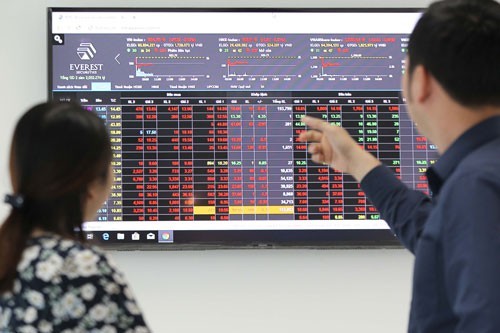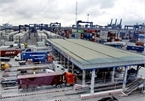The US Dow Jones and S&P 500 have exceeded the 27,000 and 3,000 point thresholds, respectively, despite the escalation of the US-China trade war.

Meanwhile, the Vietnamese stock market has been gloomy in the last few months with low liquidity, though macroeconomic factors are positive.
The latest report of the HCMC Stock Exchange (HOSE) showed that in the first six months of 2019, the average trading volume was 172.3 million securities a day, worth VND3.93 trillion, a decrease of 14.6 percent in volume and 29.5 percent in value compared with the same period last year.
|
The latest report of the HCMC Stock Exchange (HOSE) showed that in the first six months of 2019, the average trading volume was 172.3 million securities a day, worth VND3.93 trillion, a decrease of 14.6 percent in volume and 29.5 percent in value compared with the same period last year. |
Meanwhile, foreign investors’ net purchase decreased sharply by 40 percent to 201 million stocks, worth VND10.1 trillion.
At the Hanoi Stock Exchange (HNX), the average trading value dropped by 54 percent in H1 compared with the same period last year to VND451 billion per session.
On the UpCom market, the decrease was 32 percent, with VND290 billion worth of stocks traded each session.
On July 19, the VN Index of HOSE was 982 points, or very near the 1,000 point threshold. However, most securities companies advised investors to remain cautious with trading because of the low liquidity and lack of supporting information.
The situation has discouraged investors, especially small ones who have incurred big losses since 2018. The ivestors that Nguoi Lao Dong reporters met at a trading floor said they were still holding stocks they bought when the VN Index regained its peak of 1,000 threshold in early 2018.
“At the moment when I bought HBC shares, the price was 42,000 per share. I have incurred a loss of 45 percent as HBC price is now traded under VND15,000,” Hong Hoa, an investor, said, adding that the asset value had dropped from VND500 billion to VND200 billion.
“I don’t want to sell HBC at a loss, and I dare not buy more shares at this moment. So, I am just waiting and seeing if the stock prices increase,” she said.
The lackluster market has affected brokers as well.
Minh Ng, head of the brokerage team at a large securities firm in HCMC, confirmed that her income had dropped by 70 percent.
“As many investors have incurred losses over the last year, they are reluctant to make transactions at this moment,” she said
Ng said in such conditions, brokers were trying to introduce derivatives and covered warrants which promise interest rates higher than bank deposit interest rates. However, the number of investors interested in the products is still modest.
Huynh Anh Tuan, deputy CEO of Everest Securities, is still optimistic about the market, saying there are many positive factors.
Kim Chi

Listed companies may find EVFTA rules tough, say securities firms
Vietnam’s benchmark VN-Index has risen since the ratification of the EU-Vietnam trade agreement on the back of listed firms whose exports would be boosted by the deal.

Securities companies begin brokerage war as Govt scraps minimum rate
Stockbrokers’ revenues are expected to fall sharply after a price war broke out among them in the wake of Circular No 128/2018/TT-BTC, which took effect last February.
 As liquidity has been falling and investors have taken losses, buying and selling activity has slowed.
As liquidity has been falling and investors have taken losses, buying and selling activity has slowed.